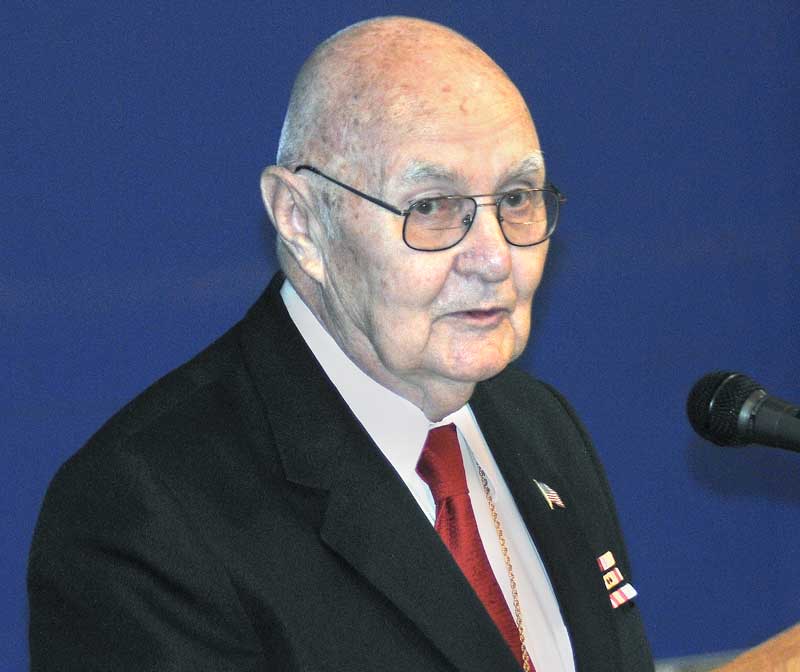When the Japanese aircraft began dropping bombs on Pearl Harbor on Sunday, Dec. 7, 1941, Bob Kerr knew what he had to do.
The company clerk of a bombing squadron, Kerr went back to headquarters to recover paperwork on his comrades. Kerr knew there would be a need for that information following the attack, he explained at Sunday’s Pearl Harbor remembrance day at the Commemorative Air Force hangar in Peachtree City.
“As clerk, I thought: ‘Hey I’ve got to do something here. Someday somebody’s going to ask me how many people in your outfit died.’”
Inside the headquarters, Kerr got his paperwork, put it inside his shirt and watched his first sergeant enter the door to ask what he was doing. Kerr explained, and the sergeant replied: “A good idea.”
“And I will tell you now, those are the last words he said,” Kerr said. “… A strafer came through and hit him. Had I not been bent down, getting the roster out of that safe, I may not be here to tell you about it.”
As Kerr left the area, a man he knew came running up with a severely injured left arm. He’d been hit in the elbow, Kerr said.
And so it was that Kerr commandeered a 2.5-ton truck in the area and loaded the wounded man in for a trip to the hospital. Others were picking up other dead and wounded men to put them in truck.
Kerr ended up driving that truck, even though he couldn’t get it out of first gear, delivering the wounded to the hospital for care.
Soldiers serving on aircraft carriers stationed off the coast were sitting ducks, unable to run like those on the mainland, Kerr said.
When the attack began, those at Hickam Field, where Kerr was at the time, took cover behind concrete block walls and the like.
“They say that we were ‘caught with our pants down,’ and indeed we were, but there was no reason for that,” Kerr said, noting that a Class-A red alert had been called off the previous day. “Had we not had that alert called off, in my opinion, on Dec. 6, it would have been a different story.”
When the attack began, Kerr and a friend were discussing where they would go that day in their co-owned 1934 Chevrolet, he explained. They were trying to decide whether to go to the mess hall for breakfast, or to a church in town where the ladies “all you sweet girls” usually had donuts, sweet rolls and coffee.
“That big decision that had to be rendered never had an answer,” Kerr said, as they heard airplanes screaming through the sky. The first thought was that it was the Navy, but it turned out to be only partially true, Kerr said. “It was the Japanese Navy.”
“We were not expecting that attack, but when it came, people did what they thought they could do … and what they didn’t know they could do.”
Kerr enlisted in the Army air corps in 1940, beginning his military career that also took him to service in the Pacific as well during World War II. He retired from the Army in 1963 as a major, holding numerous honors and decorations.
But most importantly he was an eyewitness to history in the making at Pearl Harbor, the attack that spurred the U.S. to become involved in World War II. There are few of Kerr’s generation left to share the tale, and many of those who are remaining are still serving their public duty, just like Kerr, by educating younger generations about what really happened that day.
Kerr said he enjoys speaking about Pearl Harbor “to renew a sense of pride and patriotism in the United States of America.”
He also noted that the attack still leaves many unanswered questions, including exactly who decided to call off the Class-A alert on Saturday, the day before the attack.
But despite such a cloud hanging over that fateful day, the stories of Pearl Harbor must be shared, Kerr said.
“We cannot take for granted that the blessings of liberty which we enjoy will automatically be transferred from one generation to the next. That is why I like to do it, to come to places like this and come to schools.
“… High prices were paid for the freedom we have and for the meaning of freedom. There at Pearl Harbor and other bases on the island, 2,403 paid the ultimate price for our liberty here in the United States of America.”






